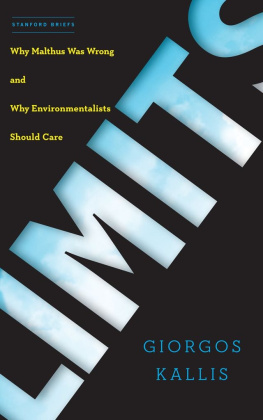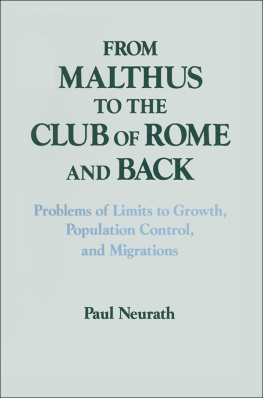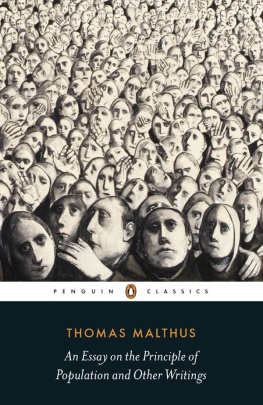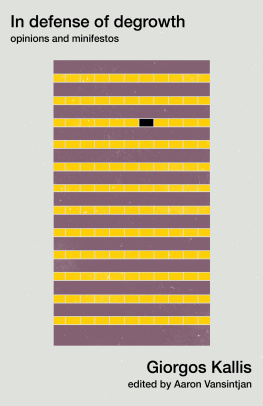Giorgos Kallis - Limits: Why Malthus Was Wrong and Why Environmentalists Should Care
Here you can read online Giorgos Kallis - Limits: Why Malthus Was Wrong and Why Environmentalists Should Care full text of the book (entire story) in english for free. Download pdf and epub, get meaning, cover and reviews about this ebook. year: 2019, publisher: Stanford University Press, genre: Politics. Description of the work, (preface) as well as reviews are available. Best literature library LitArk.com created for fans of good reading and offers a wide selection of genres:
Romance novel
Science fiction
Adventure
Detective
Science
History
Home and family
Prose
Art
Politics
Computer
Non-fiction
Religion
Business
Children
Humor
Choose a favorite category and find really read worthwhile books. Enjoy immersion in the world of imagination, feel the emotions of the characters or learn something new for yourself, make an fascinating discovery.
- Book:Limits: Why Malthus Was Wrong and Why Environmentalists Should Care
- Author:
- Publisher:Stanford University Press
- Genre:
- Year:2019
- Rating:4 / 5
- Favourites:Add to favourites
- Your mark:
- 80
- 1
- 2
- 3
- 4
- 5
Limits: Why Malthus Was Wrong and Why Environmentalists Should Care: summary, description and annotation
We offer to read an annotation, description, summary or preface (depends on what the author of the book "Limits: Why Malthus Was Wrong and Why Environmentalists Should Care" wrote himself). If you haven't found the necessary information about the book — write in the comments, we will try to find it.
Giorgos Kallis: author's other books
Who wrote Limits: Why Malthus Was Wrong and Why Environmentalists Should Care? Find out the surname, the name of the author of the book and a list of all author's works by series.
Limits: Why Malthus Was Wrong and Why Environmentalists Should Care — read online for free the complete book (whole text) full work
Below is the text of the book, divided by pages. System saving the place of the last page read, allows you to conveniently read the book "Limits: Why Malthus Was Wrong and Why Environmentalists Should Care" online for free, without having to search again every time where you left off. Put a bookmark, and you can go to the page where you finished reading at any time.
Font size:
Interval:
Bookmark:
LIMITS
Why Malthus Was Wrong and Why Environmentalists Should Care
GIORGOS KALLIS
stanford briefs
An Imprint of Stanford University Press
Stanford, California
Stanford University Press
Stanford, California
2019 by the Board of Trustees of the
Leland Stanford Junior University.
All rights reserved.
No part of this book may be reproduced or transmitted in any form or by any means, electronic or mechanical, including photocopying and recording, or in any information storage or retrieval system without the prior written permission of Stanford University Press.
Printed in the United States of America on acid-free, archival-quality paper
Cataloging-in-Publication Data is available upon request from the Library of Congress.
Cover design: Rob Ehle
Typeset by Classic Typography in 11/15 Adobe Garamond
ISBN: 9781503611566 (ebook)
CONTENTS
INTRODUCTION: WHY LIMITS?
Know no limits. All limits are self-imposed. You are your only limit. With hard work there are no limits. The only limits that exist are the ones in your own mind. Dont tell me the sky is the limit when there are footprints on the moon.
These are a few of the maxims one finds in an internet search on the word limits. Western culture is infatuated with the dream of overcoming limits. At the same time, we are overwhelmed by the ultimate limit, that of our own death, writ large as the death of Western civilization. Californias punishing drought, the New York Times tells us, has forced the state to reconsider whether its engine of growth has run against the limits of nature.
How and why have we come to think about limits the way we do? What role has the idea of limits played in the development of modern thought, from economics to environmentalism? Do societies need limits? And if they do, what kinds of limits? These are some of the questions entertained in this book.
In the following pages, I aim to reclaim, refine, and defend the notion of limits. I want to dissociate limits from what in scholarly jargon we call Malthusianisma set of ideas dating back to 1798 and an essay written by the cleric-turned-economist Thomas Robert Malthus that have come to shape the ways we think about limits. With this book, I hope to make those who invoke limits consider how best to do so; I also hope to make the critics of limits think twice before branding those of us who call for limits as Malthusians.
I would like to begin with an image from the movie The Legend of 1900 by Giuseppe Tornatore. The movies protagonist, 1900, was named for the year he was born; the newborn baby had been found on New Years Day in a box by an engine room mechanic on an ocean liner. Played by Tim Roth, 1900 never leaves the boat, where he develops a gift for piano playing. Famous jazz pianists come to the ship to duel, and he beats them all. When a music producer asks him to record an album, 1900, who has fallen in love with a passenger, decides to leave the ship. In a memorable scene, he is halfway down the ladder and the crew is out saluting goodbye. He stares at the city in front of him and balks. Turning around, he looks back to the top of the ladder and decides to remain forever aboard.
Many years later, 1900 hides in the ships hold and his friend Max begs him to leave, as the ship will be scuttled and sunk. 1900 responds: All that city.... You just couldnt see an end to it.... It wasnt what I saw that stopped me, Max. It was what I didnt see.... In all that sprawling city, there was everything except an end. Drawing an analogy to his beloved instrument, 1900 adds:
The keys begin, the keys end. You know there are 88 of them.... They are not infinite, you are infinite. On those 88 keys the music that you can make is infinite.... But you get me up on that gangway and roll out a keyboard with millions of keys, and... theres no end to them, that keyboard is infinite. But if that keyboard is infinite theres no music you can play.Times are hard for those who want to live within limits. Airplanes have replaced ocean liners, and 1900 sinks together with the boat. The limit of death is the stuff of Greek tragedy, not Hollywood blockbusters1900 sank in the box office as well. But to face global warming, we desperately need a culture of limits. This book is an effort to go in such a direction.
WHY LIMITS?
I am an environmentalist and limits are the central idea of environmentalism. Limits are back:
Born in 1972, the same year that the Limits to Growth report was published, I find that the debate between supposed optimists and pessimists has been exhausted. These opposing views are but two sides of the same coin. Without limits, capitalisms quest for endless growth does not make sense. Malthus and other early priests of capitalism constructed a picture whereby unlimited human wants clash with a limited world. Scarcity and growth became an inseparable pair, with limits spurring efforts for growth. My thesis is that it is only when we begin to accept the world as abundant that we can contemplate limiting our wants and delimiting a safe space for our freedom. This notion may appear counterintuitive, but thats because we tend to think of limits in the Malthusian terms of scarcity. This book develops a different view of limits, one of limits as self-limitation , a view that I will trace from radical Greens back to the Romantics and even further back to the ancients.
Beginning with a rereading of Malthuss 1798 Essay on the Principle of Population , I argue that Malthus discovered not natural limits but unlimited wants. Far from a prophet of doom, Malthus invoked doom so as to galvanize the pursuit of growth. We will see how Malthus is still with us thanks to modern economics, which was founded on this myth of eternal scarcity and a call for perpetual growth. I will explain how some environmentalists got trapped in this Malthusian vision of a limited and scarce world and why this is problematic. And I will make a case for self-limitationthe establishment of self-imposed and deliberately chosen limitsas distinct from the Malthusian limits we attribute to our internal or external world, which we must either overcome or succumb to. I will then turn to classical Greece as a civilization with a culture of self-limitation. There, and in the next chapter, where I deal with the limits of my own defense of limits, I will follow the novelists advice to write less about what I know and more about what interests me and what I want to know more about. I will close the book, though, more assertively, unapologetically defending the desire for limits.
In my first job, at the European Parliament, I worked on the revision of the EU laws that placed limits on water pollution. I witnessed firsthand the chemical lobbys assault on environmental regulation fueled by an economic discourse that denied the need for limits. Returning to graduate school, I studied ecological economics and learned about limits to growth.
In hindsight, ever since then my work has been an effort to synthesize ecological economics and political ecology to develop a more nuanced approach to limits. I found what I was looking for in the work of a fellow Greek, Cornelius Castoriadisbedside reading of my mothers that I rediscovered as an adult. Castoriadis distinguishes between heteronomylimits that we attribute to God or nature and that restrict our freedomand autonomy, limits that we consciously set for ourselves. That distinction is the kernel of this book.
The debate about limits has political implications. The green idea that there should be limits to growth seems to choke on the progressive ideal of universal betterment. While many lean toward denial of or indifference to global warming, others place their bets on limitless technology and growth, the forces that have brought us where we are today. In a culture intolerant of limits, limiting fossil fuels and the comforts they sustain seems impossible. My intention here is to open up an intellectual and political space for rethinking limits.
Next pageFont size:
Interval:
Bookmark:
Similar books «Limits: Why Malthus Was Wrong and Why Environmentalists Should Care»
Look at similar books to Limits: Why Malthus Was Wrong and Why Environmentalists Should Care. We have selected literature similar in name and meaning in the hope of providing readers with more options to find new, interesting, not yet read works.
Discussion, reviews of the book Limits: Why Malthus Was Wrong and Why Environmentalists Should Care and just readers' own opinions. Leave your comments, write what you think about the work, its meaning or the main characters. Specify what exactly you liked and what you didn't like, and why you think so.









